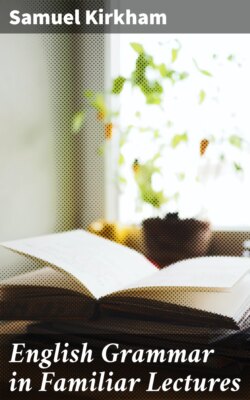Читать книгу English Grammar in Familiar Lectures - Samuel Kirkham - Страница 4
На сайте Литреса книга снята с продажи.
HINTS TO TEACHERS AND PRIVATE LEARNERS.
ОглавлениеTable of Contents
As this work proposes a new mode of parsing, and pursues an arrangement essentially different from that generally adopted, it may not be deemed improper for the author to give some directions to those who may be disposed to use it. Perhaps they who take only a slight view of the order of parsing, will not consider it new, but blend it with those long since adopted. Some writers have, indeed, attempted plans somewhat similar; but in no instance have they reduced them to what the author considers a regular systematic order.
The methods which they have generally suggested, require the teacher to interrogate the pupil as he proceeds; or else he is permitted to parse without giving any explanations at all. Others hint that the learner ought to apply definitions in a general way, but they lay down no systematic arrangement of questions as his guide. The systematic order laid down in this work, if pursued by the pupil, compels him to apply every definition and every rule that appertains to each word he parses, without having a question put to him by the teacher; and, in so doing, he explains every word fully as he goes along. This course enables the learner to proceed independently; and proves, at the same time, a great relief to the instructer. The convenience and advantage of this method, are far greater than can be easily conceived by one who is unacquainted with it. The author is, therefore, anxious to have the absurd practice, wherever it has been established, of causing learners to commit and recite definitions and rules without any simultaneous application of them to practical examples, immediately abolished. This system obviates the necessity of pursuing such a stupid course of drudgery; for the young beginner who pursues it, will have, in a few weeks, all the most important definitions and rules perfectly committed, simply by applying them in parsing.
If this plan be once adopted, it is confidently believed that every teacher who is desirous to consult, either his own convenience, or the advantage of his pupils, will readily pursue it in preference to any former method. This belief is founded on the advantages which the author himself has experienced from it in the course of several years, devoted to the instruction of youth and adults. By pursuing this system, he can, with less labor, advance a pupil farther in a practical knowledge of this abstruse science, in two months, than he could in one year when he taught in the "old way." It is presumed that no instructor, who once gives this system a fair trial, will doubt the truth of this assertion.
Perhaps some will, on a first view of the work, disapprove of the transposition of many parts; but whoever examines it attentively, will find that, although the author has not followed the common "artificial and unnatural arrangement adopted by most of his predecessors," yet he has endeavored to pursue a more judicious one, namely, "the order of the understanding."
The learner should commence, not by committing and rehearsing, but by reading attentively the first two lectures several times over. He ought then to parse, according to the systematic order, the examples given for that purpose; in doing which, as previously stated, he has an opportunity of committing all the definitions and rules belonging to the parts of speech included in the examples.
The COMPENDIUM, as it presents to the eye of the learner a condensed but comprehensive view of the whole science, may be properly considered an "Ocular Analysis of the English language." By referring to it, the young student is enabled to apply all his definitions and rules from the very commencement of his parsing. To some, this mode of procedure may seem rather tedious; but it must appear obvious to every person of discernment, that a pupil will learn more by parsing five words critically, and explaining them fully, than he would by parsing fifty words superficially, and without understanding their various properties. The teacher who pursues this plan, is not under the necessity of hearing his pupils recite a single lesson of definitions committed to memory, for he has a fair opportunity of discovering their knowledge of these as they evince it in parsing. All other directions necessary for the learner in school, as well as for the private learner, will be given in the succeeding pages of the work. Should these feeble efforts prove a saving of much time and expense to those young persons who may be disposed to pursue this science with avidity, by enabling them easily to acquire a critical knowledge of a branch of education so important and desirable, the author's fondest anticipations will be fully realized; but should his work fall into the hands of any who are expecting, by the acquisition, to become grammarians, and yet, have not sufficient ambition and perseverance to make themselves acquainted with its contents, it is hoped that the blame for their nonimprovement, will not be thrown upon him.
